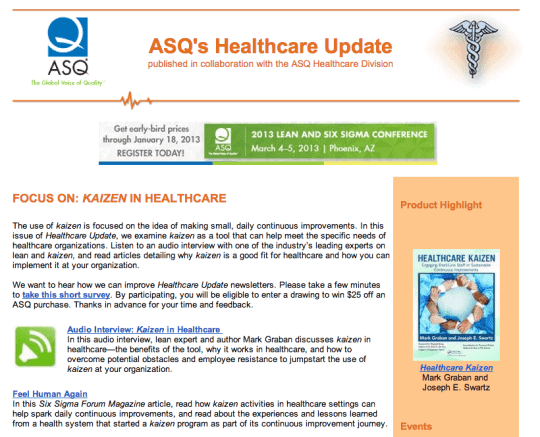Thanks to ASQ for posting an audio interview they did with me last month about my book (with Joe Swartz), Healthcare Kaizen: Engaging Front-Line Staff in Sustainable Continuous Improvements.
Listen to the interview (MP3 file – 14 minutes)
ASQ also posted a free link (registration probably required) to the journal article that Joe and I co-authored for Six Sigma Forum Magazine (although our article has no real connection to Six Sigma):
Feel Human Again: Kaizen activities in healthcare settings spark daily continuous improvements
You can find links to other related articles on healthcare quality improvement via this online archive of their email newsletter, or click on the image below.
One small correction is required… Figure 4 should be labeled “Percentage of employees participating in kaizen improvements” not “kaizen events.” I don't know if I should have caught that defect during the author review process or if that happened somehow after our review… oh well.
Article Summary:
With the increase in automation in healthcare settings in recent years, medical technologists and other healthcare personnel often feel that they are merely performing menial tasks. Lean management and kaizen are exactly the methods needed to reinvigorate people working in healthcare for the benefit of patients, staff, and entire healthcare organizations.
Kaizen is best represented by small, low-cost, low-risk improvements that can be initiated and implemented by those who do the actual work. Kaizen-style improvement emphasizes creativity over capital. This article discusses how, using this approach, Franciscan St. Francis Health System in Indianapolis implemented more than 4,200 kaizen-style improvements (an average of about two improvements per employee) in 2011 alone. In some instances, a hospital may need to spend a little money to improve a process, but more often, it can find simple, effective changes that don't cost much at all. There may be a need for large projects, such as implementing a new electronic medical records (EMR) system, but there's also a great need and a great capacity for small daily improvements, such as how to make more effective use of the EMR after implementation.
Two reasons often given for not using kaizen are lack of time and resistance to change; the solutions are to provide time for managers and staff to work on kaizen, and to approach change as being about people improving their own work rather than having change forced on them. The article explores one creative example at Franciscan St. Francis, where young patients undergoing ultrasound procedures often screamed and wouldn't stay still. An ultrasound technician attending a wedding realized that the small wedding favor bottles of bubbles could be used to calm, distract, and entertain the children, resulting in more pleasant patient encounters and higher quality ultrasound images. For the kaizen method to be successful, organizational leaders must practice kaizen themselves; ask people to participate in kaizen on an ongoing basis; and give recognition for improvements that are made.
Please scroll down (or click) to post a comment. Connect with me on LinkedIn.
Let’s work together to build a culture of continuous improvement and psychological safety. If you're a leader looking to create lasting change—not just projects—I help organizations:
- Engage people at all levels in sustainable improvement
- Shift from fear of mistakes to learning from them
- Apply Lean thinking in practical, people-centered ways
Interested in coaching or a keynote talk? Let’s start a conversation.











[…] Mark’s Note: Today’s guest post is by Joe Swartz, my co-author for the book Healthcare Kaizen and the newly-released book The Executive Guide to Healthcare Kaizen. I’m hoping Joe will be a regular contributor in the future and I’ll be doing a podcast with him soon about his experiences at the Franciscan St. Francis Health System. Also, check out this video about their Kaizen approach. You can also read a journal article we co-authored. […]
[…] Mark’s Note: Today brings another guest post from Joe Swartz, my co-author for our Healthcare Kaizen series of books. Read his previous posts here. I also did a podcast with him about his experiences at the Franciscan St. Francis Health System. Also, check out this video about their Kaizen approach. You can also read a journal article we co-authored. […]